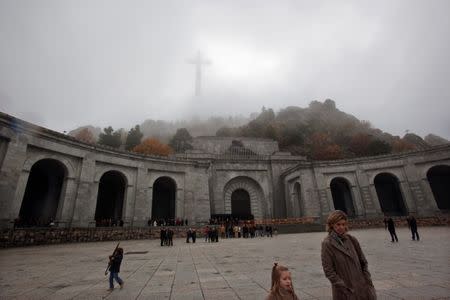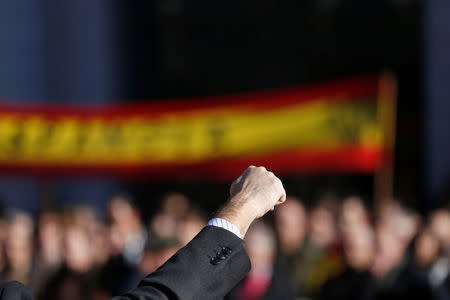Spanish parliament urges government to exhume Franco's remains
By Inmaculada Sanz MADRID (Reuters) - Spain's opposition parties voted on Thursday to move the remains of fascist dictator Francisco Franco out of a state-funded mausoleum, in a non-binding parliamentary motion the government is likely to resist. The motion, backed by parties on the left and center, reflected growing pressure from campaign groups and politicians to turn the site into a broader memorial honoring those who died on both sides of Spain's 1936-1939 civil war. It was passed by 198 votes to one, while 140 lawmakers abstained, including those from the conservative People's Party (PP) of Prime Minister Mariano Rajoy. The PP has long opposed attempts to exhume Franco's body, saying this would only stir up painful memories more than four decades after his death and nearly 80 years after the end of the war. The motion also called for tens of thousands of other bodies buried at the mausoleum just outside Madrid, known as the Valley of the Fallen, to be exhumed too. Many of those interred there fought for the losing Republican side and were moved to the monument under Franco's dictatorship without their families' permission. The 150-metre cross of the Valley of the Fallen monument, built by prisoners of war, towers over the Guadarrama Sierra, a mountain range west of Madrid. Opened by Franco himself in 1959, the Valley houses a Catholic basilica set into a hillside, where the founder of Spain's fascist Falange party, Jose Antonio Primo de Rivera, is also interred. It has long been a site of pilgrimage for far-right groups in Spain. The then-Socialist government approved a so-called 'Law of Historical Memory' in 2007, aimed at giving greater recognition to victims on both sides of the war. It has not always been easy to implement, however, in a country where many streets and squares still bear Franco's name, and the PP cut state funding for this initiative after it came to power in late 2011. Tuesday's motion was spearheaded by the Socialist party, which called for Franco to be moved to a private burial site and for the Valley to be converted into an information center. "The government has a democratic duty to understand that our historical memory belongs to all of us, and that the wounds of the past will only be cured with greater truth," Socialist lawmaker Gregorio Camara told a parliamentary session earlier this week. (Reporting by Inmaculada Sanz; Writing by Jesús Aguado and Sarah White; Editing by Mark Trevelyan)


